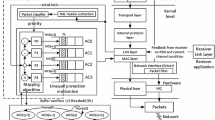Abstract
We present an unequal decoding power allocation (UDPA) approach for minimization of the receiver power consumption subject to a given quality of service (QoS), by exploiting data partitioning and turbo decoding. We assign unequal decoding power of forward error correction (FEC) to data partitions with different priority by jointly considering the source coding, channel coding and receiver power consumption. The proposed scheme is applied to H.264 video over additive white Gaussion noise (AWGN) channel, and achieves excellent tradeoff between video delivery quality and power consumption, and yields significant power saving compared with the conventional equal decoding power allocation (EDPA) approach in wireless video transmission.
Similar content being viewed by others
References
Cheung G, Zakhor A. Bit allocation for joint source channel coding of scalable video [J]. IEEE Transactions Image on Processing, 2000, 9(3): 340–356.
Mohr A, Ridkin E, Ladner R. Unequal loss protection: graceful degradation of image quality over packet erasure channel through forward error correction [J]. IEEE Journal on Selected Areas in Communications, 2000, 18(6): 819–828.
Yang X K, Zhu C, Li Z G, Lin X, Ling N. An unequal packet loss resilience scheme for video over the internet [J]. IEEE Transactions on Multimedia, 2005, 7(4): 753–765.
Yang X K, Zhu C, Li Z G, Lin X, Feng G N, Wu S, Ling N. Unequal loss protection for motion compensated video streaming over the Internet [J]. Signal Processing: Image Communication, 2003, 18(3): 157–167.
Eisenberg Y, Luna C E, Pappas T N, Berry R, Katsaggelos A K. Joint source coding and transmission power management for energy efficient wireless video communications [J]. IEEE Transactions on Circuits System Video Technology, 2002, 2(6): 411–424.
Zhang Q, Ji Z, Zhu W, Zhang, Y Q. Powerminimized bit allocation for video communication over wireless channels [J]. IEEE Transactions on Circuits System Video Technology, 2002, 12(6): 389–410.
Lu X, Erkip E, Wang Y. Power efficient multimedia communication over wireless channels [J]. IEEE Journal Selected Areas Communications, 2003, 21(12): 1738–1751.
Boggia G, Camarda P, Grieco L A, Mascolo S. Energy efficient feedback-based scheduler for delay guarantees in IEEE 802.1e network [J]. Computer Communications, 2006, 10(3): 1–13.
Yuan Y, Yang Z K, He Z, He J. An integrated energy aware wireless transmission system for QOS provisioning in wireless sensor network [J]. Computer Communications, 2006, 29(2): 671–682.
He Z, Liang Y, Chen L A I, Wu D. Power-ratedistortion analysis for wireless video communication under energy constraints [J]. IEEE Transactions on Circuits and Systems for Video Technology, 2006, 15(5): 645–658.
JVT-G050. Draft ITU-T recommendation and final draft international standard of joint video specification (ITU-T Rec.H.264/ISO/IEC 14496-10 AVC) [S]. Joint Video Team (JVT) of ISO/IEC MPEG and ITUT VCEG, Pattaya, Thailand, 2003.
Brink S. Convergence behavior of iteratively decoded parallel concatenated codes [J]. IEEE Transactions on Communications, 2001, 49(10): 1727–1737.
Smit L T, Smit G J, Havinga P J, Hurink J L, Broersma H J. Influences of rake receiver/turbo decoder parameters on energy consumption and quality [C]// Proceedings of 2002 International Conference on Third Generation Wireless and Beyond, San Francisco, USA. 2002: 227–235.
H. 264 reference software version JM8.6 [EB/OL]. (2004-10) [2009-9-10]. http://iphome.hhi.de/suehring/tml/.
Robertson P, Villebrun E, Hoeher P. A comparison of optimal and sub-optimal decoding algorithms operating in the log domain [C]// Proceedings 1995 IEEE International Conference on Communications, Seattle, USA. 1995: 1009–1013.
Shao R Y, Lin S, Fossorier M P C. Two simple stopping criteria for turbo decoding [J]. IEEE Transactions on Communications, 1999, 47(8): 1117–1120.
Author information
Authors and Affiliations
Corresponding author
Additional information
Communicated by FANG Yong
Project supported by the Scientific Research Innovation Project of the Shanghai Municipal Education Commission (Grant No.08YZ18), the Key Project of Natural Science Foundation of China (Grant No.60832003), the National Natural Science Foundation of China (Grant Nos.60972137, 60672052), the Innovation Foundation Project of Shanghai University, and the Special Research Foundation of Shanghai Excellent Youth University Teacher Training
About this article
Cite this article
Wang, Yf., Yu, Sy., Yang, Xk. et al. Unequal decoding power allocation for efficient video transmission. J. Shanghai Univ.(Engl. Ed.) 14, 60–65 (2010). https://doi.org/10.1007/s11741-010-0112-2
Received:
Accepted:
Published:
Issue Date:
DOI: https://doi.org/10.1007/s11741-010-0112-2




